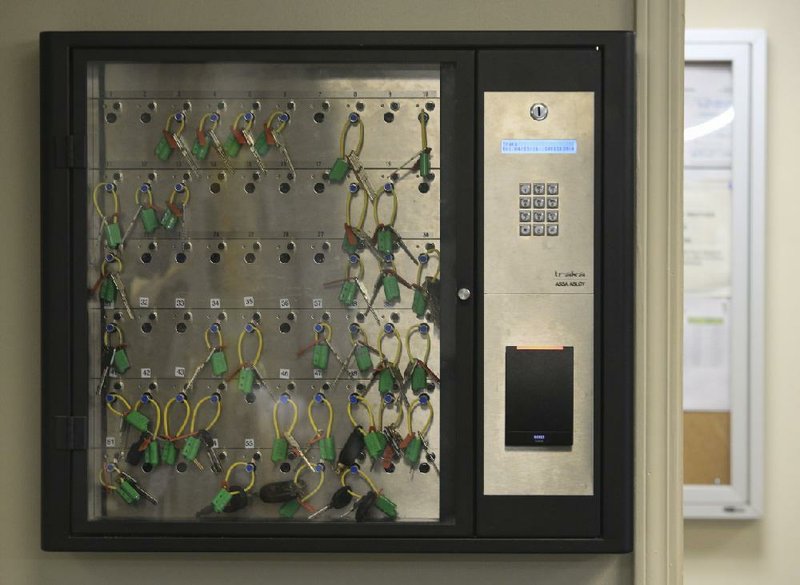Everyone has seen a custodian with a large ring full of keys jangling from his belt.
That's one image, though, that won't be seen anymore at the state's largest airport, which has gotten preliminary approval to install a high-security key management system.
The Little Rock Municipal Airport Commission's lease and consultant selection committee last week recommended spending $58,717.35 to purchase and install four electronic key cabinets around Bill and Hillary Clinton National Airport/Adams Field as a way to control and track access on who is going through which locked door or who is driving what vehicle.
The key management system is the latest in high-tech gadgetry that is making its way into airports and other transportation hubs around the nation after the Sept. 11, 2001, terrorist attacks.
The airport also has since installed a $6 million camera surveillance system, thanks to a grant from the Transportation Security Administration, and a more robust personnel identification system that uses badges, fingerprints and background to limit who can access the most sensitive areas of the airport.
"It's another layer of security," said Ron Mathieu, the executive director at Clinton National.
Along with the key cabinets comes software that will allow senior airport personnel to limit employee access to some areas, conduct audits of key use and receive email alerts whenever someone doesn't turn in a key within a specified time. The price tag also includes training.
"It brings more keys in our system under the control of that system and then it takes those keys that are currently on people's key rings because they have been physically assigned to them and puts them in that box so they can be accounted for and secured every day," said Randy Ellison, the airport's facilities director.
The staff proposal came after more than a year of evaluating an electronic key box that was installed in a maintenance area in the secure part of the airport.
Employees who have authorization must swipe their badge on the cabinet and then punch in their own four-digit code before the cabinet door is unlocked.
Once the door is opened, the keys a particular employee is authorized to access are indicated with green lights and the keys to which they are not authorized to use are indicated with red lights. All the keys have fob-like locking mechanisms that prevent them from being removed if the employee isn't authorized to use them.
When a key is removed, the empty space is indicated with a yellow light, allowing the employee to see where the slot for the key is when the key is returned.
"It's worked very well for us, and that's why we're requesting these additional cabinets to be made available," Ellison told the committee.
But it took some time to convince Virgil Miller Jr., the commission chairman who isn't a committee member but who participated in the committee meeting. Typically, the committee has three members, but the Little Rock Board of Directors has yet to fill a vacancy on the seven-member commission, leaving the committee with just two members, committee Chairman Stacy Hurst and Gus Vratsinas.
The initial presentation appeared to leave Miller with the impression that the additional key boxes were merely for convenience so employees wouldn't have to go to one central location on the sprawling airport property -- which takes up 1,200 acres -- to check out a key.
"Did somebody complain about walking?" Miller asked at one point.
At another, Miller said the proposal seemed to defeat the purpose of controlling access to keys.
"If we are trying to limit access and maintain control, it would seem to me that purchasing four more cabinets with four more sets of keys in them is not the way to do that," he said. "We have a system in place now. It appears to be working.
"There seems to be some inconvenience for employees to go from one part of the wherever they are to where the central location is. But I'm a little concerned this may not be the best way to control access with four more cabinets with four more sets of keys."
But staff members said that wasn't the case at all. The one key cabinet has 60 spaces, which are all used by facilities and maintenance personnel. The additional cabinets would allow all keys and employees to be brought under the system.
"I want to make sure we're focusing on the security, not the convenience," Ellison said. "I apologize if that's how it was presented.
"It's not so much a convenience as it is the ability for us for the first time to really have positive control and security for all our keys and allow each department head to determine who has access to a key in a particular box."
Ellison said cabinets will be placed in the airport's information systems and electronic shop. Another cabinet will be in the second-floor administration offices and the fourth will be in the facility office, he said.
Hurst, given the explanation of the technology behind the system, remarked, "That's why it's so expensive."
While the price tag is high for the system, the price tag for a missing key, particularly a master key, is far higher, airport officials said.
"It's well worth it," Ellison said. "If we ever have to re-key ... that's when you really get into some costs, and this will keep us from having to do that."
Mathieu recalled an instance at another airport at which he worked that saw "a fairly high-ranking employee who left with a master key."
"It costs us nearly $300,000 to re-key all of the areas," Mathieu said. "Part of the focus on overall physical and asset security is to limit access to these things and only give people what they need to get their job done."
Metro on 04/18/2016

